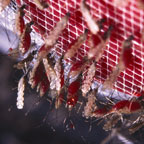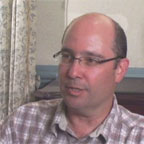|
|
 | Scientists at Johns Hopkins Malaria Research Institute identified a sugar in mosquitoes that helps explain, for the first time, the mechanism of the malaria parasite invasion. The finding could be a key element for a vaccine development in the fight against malaria. Zulima Palacio of VOA News spoke with the authors of the research for video report.
Video (Widows Player) | Article | News Release |
 |
Targeted delivery of drugs. Innovative ways to filter water. Stain-free slacks... The benefits of nanotechnology—the engineering of materials on a molecular scale—seem limited only by human imagination. But no one knows how nanomaterials will affect human health. Jonathan Links, a co-founder of the Johns Hopkins Institute for NanoBioTechnology, met recently with Johns Hopkins Public Health editor Brian W. Simpson to discuss the public health aspects of this new technology.
Video (Quicktime) | Article |
 |
By 2050, the number of people living with Alzheimer’s disease worldwide will quadruple to 106 million, according to a study led by Ron Brookmeyer, PhD, a professor in the Department of Biostatistics at the . In this interview, Brookmeyer explains his findings and what they could mean for the treatment of Alzheimer’s in the future.
Video (Quicktime) | Article
|
|
| |
George Wills Comstock, a physician and professor emeritus at the Johns Hopkins Bloomberg School of Public Health, died on July 15, 2007, at his home in Smithsburg, Md. at age 92. He was a distinguished epidemiologist who conducted seminal research on tuberculosis control and treatment and on cancer, heart disease and lung disease. In November 2000, he discussed his life and career for the video "Lucky All My Life."
Video (Real Player) | Obituary
|
A community-based program in rural India that reduced a region’s neonatal mortality by 50 percent is the subject of a new video produced by the Global Health Council.
Video (Real Player) | Article |
In the village of Lupata, Zambia, Rebekah Kent collects mosquitoes that she will later examine in the lab to determine the extent of the malaria parasite's reach in the area. Few entomological studies have been done there so "everything we are finding out is relatively new, which makes it very exciting," says Kent. During this January 2006 interview, she was a doctoral student at the Johns Hopkins Bloomberg School of Public Health. Kent is now a postdoctoral investigator with the CDC. She is interviewed by Brian W. Simpson, editor of Johns Hopkins Public Health magazine.
Video (QuickTime) | Article
|
Every year since 1983, pediatrician Phil Thuma has fought to save the lives of the children of Macha, Zambia during the February-to-May malaria season. Thuma saw that treatment alone wasn't enough and began a research effort that has led to a collaboration with the Johns Hopkins Malaria Research Institute, which established a major research site there in 2005. In this January 2006 interview in Macha with Johns Hopkins Public Health magazine editor Brian W. Simpson, Thuma reflects on the challenge of fighting malaria in rural Africa and the promise of new artemisinin-based treatments.
Video (QuickTime) | |
Marcelo Jacobs-Lorena, PhD, and his colleagues at the Johns Hopkins Malaria Research Institute are studying ways to make mosquitoes resistant to the parasite that causes malaria. In theory, mosquitoes that are resistant to malaria would not transmit the disease to humans.
Video (QuickTime) | Article | Magazine Preview |
Prince Zeid Ra’ad Zeid Al-Hussein, Jordan’s Ambassador to the U.S., and Ambassador Feisal Al-Istrabadi, Iraq’s Deputy Permanent member to the United Nations, discussed the future of Iraq during a March 22 symposium at the Johns Hopkins Bloomberg School of Public Health.
Video 1 | Video 2 | Video 3 (Real Player) | Article |
New research by Elizabeth Selvin, PhD, MPH, indicates that more than 18 million men in the United States are affected by erectile dysfunction. She explains how age, cardiovascular disease, diabetes and a lack of physical activity contribute to this condition.
Video (QuickTime) | Article |
| |
Zulima Palacio of Voice of America News looks at new approaches to fighting malaria with researchers from the Johns Hopkins Malaria Research Institute. (Story courtesy voanews.com)
Video (Real Player) | Article |
Changes in the environment could have serious consequences on our health. Cindy Parker, MD, MPH, an environmental health expert with the Bloomberg School’s Center for Public Health Preparedness, discusses the potential risks to human health and the unique role clinicians and public health workers play in helping to limit global environmental change.
Video (QuickTime) | Article |
From a riverbed and a remote community near Macha, Zambia, Doug Norris explains his research into the puzzle of malaria transmission. Norris, an assistant professor of Molecular Microbiology and Immunology, is gathering the basic science of how Anopheles mosquitoes feed, breed and transmit malaria in an area never before documented by malaria scientists. Interview by Brian W. Simpson, editor of Johns Hopkins Public Health Magazine.
Video (QuickTime) |
Michael J. Klag, dean of the Bloomberg School of Public Health, was joined by his predecessors Alfred Sommer and D.A. Henderson for a discussion of public health’s past, present and future. The session kicked off the School’s new Bloomberg Leadership Series, designed to foster leadership development across the entire student body.
Article | Video |
Dr. Albert Wu, is a professor in the Department of Health Policy and Management at the Bloomberg School of Public Health and a member of the Institute of Medicine committee that issued a report on medication errors in the United States.
Video (Real verision) | Video (QuickTime version) | Audio | Article |
Anbumani Ramadoss, MBBS, India’s minister for health and family welfare, visited the Johns Hopkins Bloomberg School of Public Health on June 28 to talk about HIV prevention and improvements to health in India. He discussed some of his strategies in an interview with Dr. Mathuram Santosham, professor in the Bloomberg School’s Department of International Health.
Video | Audio | Presentation (high bandwidth) | Presentation (low bandwidth) | Article
|
Sommer Scholars Jessica Greenberg and Raj Panjabi interviewed Mary Robinson, the former president of Ireland. Robinson was the keynote speaker of the Johns Hopkins Bloomberg School of Public Health 2006 Annual Dr. Leroy E. Burney Lecture on April 11. In her presentation, “Realizing Rights in Practical Ways: Tackling Poverty in Africa,” she addressed the need for grassroots efforts to establish integrated health care systems to combat poverty.
Video | Audio | Presentation | Article |
Mowing the lawn can be a weekly ritual of the spring and summer months for many Americans. However each year, nearly 80,000 Americans require hospital treatment from injuries caused by lawn mowers, according to a study conducted by Dr. David Bishai, associate professor in the Department of Population and Family Health Sciences at the Johns Hopkins Bloomberg School of Public Health.
Video | Audio | Article |
Using complex computer models, a team of researchers analyzed how effective travel restrictions, school closures, drug distribution and other public health strategies would be in slowing the spread of a pandemic flu outbreak.
Video | Article |
World-renowned biologist, Fotis Kafatos, was the keynote speaker at the Third International Malaria Research Conference sponsored by the Johns Hopkins Malaria Research Institute. Kafatos discussed his career and the importance of his malaria research with George Dimopoulos, PhD, a former student of Kafatos and assistant professor in the Bloomberg School’s Department of Molecular Microbiology and Immunology.
Video | Audio | Images | Additional Coverage |
In the 1957 television program, Johns Hopkins File 7, renowned epidemiologist Dr. Charlotte Silverman traces the origins and spread of the Asian flu pandemic (H2N2), which killed nearly 2 million deaths worldwide that year.
Video | Article |
On January 30, 2006, Michael J. Klag, MD, MPH, dean of the Johns Hopkins Bloomberg School of Public Health, convened a day-long symposium to examine the public health aspects of a potential pandemic like H5N1 avian influenza. The event, entitled “Avian Flu: The Pandemic Threat and the Global Strategy,” brought together experts on every facet of the avian flu, to educate the wider community on what we know and don’t know about this alarming disease.
Video | Article |
| |
The 17-year, $4 billion polio eradication campaign has been marked by great successes yet an elusive finale. Don Burke, professor of International Health at the Bloomberg School, talks with David Heymann, leader of the global campaign, about the program's current status and prospects for the future.
Video | Audio | Presentation
|
Apoptosis—or cell suicide—helps rid the body of infected and damaged cells, but when it goes awry it can cause disease. The Bloomberg School's Marie Hardwick, PhD, talks about her pioneering research into the phenomenon and how it may lead to new ways to prevent disease. Interview with Johns Hopkins Public Health Magazine editor Brian W. Simpson.
Video | Audio |
"If you want to save the world, work with good people," advises Paul Farmer in an interview with Hopkins Sommer Scholars Lydia Mann-Bondat and Raj Panjabi. The founder of Partners in Health and the subject of the book Mountains Beyond Mountains talks about his most recent work in Rwanda and shares his advice for those interested in global health. (Excerpts from the interview.)
Video | Audio | Presentation |
Don Burke, a professor of International Health, discusses the importance of disease forecasting and his latest research in an interview with Johns Hopkins Public Health Magazine editor Brian W. Simpson.
Audio |
Four days after Hurricane Katrina devastated the U.S. Gulf Coast, Kellogg Schwab, PhD, was on a plane to Alabama, sent there by the American Red Cross to assist with the assessment of shelters in the region. Dr. Schwab sat down with us to discuss his observations and his role in the assessment.
Video | Audio | Photo essay |
Removing Insult from Injury: Disclosing Adverse Events is an instructional video developed by researchers at the Johns Hopkins Bloomberg School of Public Health to help health care providers find the best ways to disclose adverse events.
Article | Information | Video 1 | Video 2 | Video 3
|
On Wednesday, May 14, 2003, experts from the Johns Hopkins Bloomberg School of Public Health discussed the origins, prevention, and control of severe acute respiratory syndrome (SARS), the global pandemic that is disrupting life and commerce.
Video | Article |
